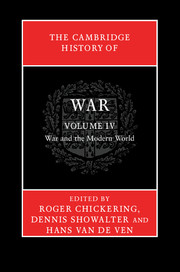Book contents
- Frontmatter
- Contents
- Illustrations
- Maps
- Notes on contributors
- Introduction to volume IV
- Part I The industrialization of warfare, 1850–1914
- Part II The Era of Total War, 1914–1945
- Part III Post-total warfare, 1945–2005
- 17 Military occupations, 1945–1955
- 18 The wars after the war, 1945–1954
- 19 Weapons technology in the two nuclear ages
- 20 Conventional war, 1945–1990
- 21 Wars of decolonization, 1945–1975
- 22 War and memory since 1945
- 23 The era of American hegemony, 1989–2005
- Select bibliography
- Index
- References
22 - War and memory since 1945
from Part III - Post-total warfare, 1945–2005
Published online by Cambridge University Press: 05 December 2012
- Frontmatter
- Contents
- Illustrations
- Maps
- Notes on contributors
- Introduction to volume IV
- Part I The industrialization of warfare, 1850–1914
- Part II The Era of Total War, 1914–1945
- Part III Post-total warfare, 1945–2005
- 17 Military occupations, 1945–1955
- 18 The wars after the war, 1945–1954
- 19 Weapons technology in the two nuclear ages
- 20 Conventional war, 1945–1990
- 21 Wars of decolonization, 1945–1975
- 22 War and memory since 1945
- 23 The era of American hegemony, 1989–2005
- Select bibliography
- Index
- References
Summary
For those who live in the western world, the period since 1945 is generally considered an era of peace, in sharp contrast to the warlike nature of the period that ended with the defeat of the Axis powers in 1945. The situation looked very different to millions of people who lived in Vietnam, Nigeria, East Pakistan, or Korea. Nor would people in Northern Ireland, Algeria, or Bosnia have agreed that warlike Europe had turned peaceful in the era that followed the world war. The division point of 1945 was itself less significant to people who lived in Africa or Latin America than to those who lived in the west or the Asia–Pacific region.
However, these observations should not obscure another reality: modern global memory of war has been primarily shaped since 1945 by the experience and aftershocks of the global conflict of the 1930s and 1940s. Even wars a long way from Europe, such as the wars over the secessions of Biafra and Bangladesh, were shaped by a decolonization process that was triggered by the collapse of European empires in World War II, as well as by a new understanding of the ability of non-western peoples to forge their own destinies. In the powers that had fought the war, the memory of events, from the Holocaust and the Nanjing Massacre to the atomic bombings of Hiroshima and Nagasaki, shaped political formations (such as the European Union) and popular culture (such as the Godzilla movies of the 1960s). Perceptions of prewar politics – for instance, the rise of charismatic but dangerous leaders in Europe – shaped how the victorious Allied powers formed politics. Postwar German politics was shaped so it could never allow a Hitler-figure to reemerge.
- Type
- Chapter
- Information
- The Cambridge History of War , pp. 542 - 565Publisher: Cambridge University PressPrint publication year: 2012



